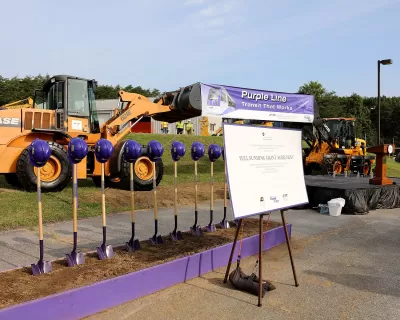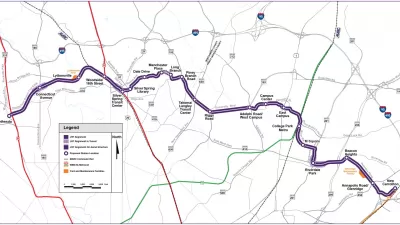Affordable housing advocates and other community groups in Maryland are calling for early and robust mitigation efforts to prevent displacement of longtime residents and businesses along the new Purple Line corridor.

A coalition calling itself the Purple Line Corridor Coalition is raising concerns about displacement and rising housing costs along Maryland's Purple Line train. Construction on the line, which was scheduled to open in March 2022, has been on hold since September 2020, when its primary contractor resigned. As Katherine Shaver reports, advocates hope the pause will provide a chance to implement programs that will position the project to provide equal opportunities to all residents along the new alignment.
Coalition members say they want the Purple Line to help revitalize communities while avoiding the kind of gentrification-fueled displacements seen around Metro stations in the District’s U Street Corridor and Columbia Heights. Doing so, they say, requires addressing the potentially harmful effects of economic development that new transit lines are designed to attract — years before the line opens.
Based out of the University of Maryland, the coalition is developing a public-private approach to preserving and creating new affordable housing and protecting existing homes and businesses, which are experiencing disruptions due to construction even as the line languishes without a contractor. According to the article, "The coalition is supporting small-business owners during construction by helping them ramp up social media marketing, apply for government financial aid and participate in public promotions that encourage residents to patronize Purple Line-area businesses." The coalition is also developing initiatives to collaborate with nonprofit housing developers on preserving affordable housing and calling on governments to finance low-cost housing.
FULL STORY: Along the Purple Line, worries that new transit will bring higher rents

Maui's Vacation Rental Debate Turns Ugly
Verbal attacks, misinformation campaigns and fistfights plague a high-stakes debate to convert thousands of vacation rentals into long-term housing.

Planetizen Federal Action Tracker
A weekly monitor of how Trump’s orders and actions are impacting planners and planning in America.

In Urban Planning, AI Prompting Could be the New Design Thinking
Creativity has long been key to great urban design. What if we see AI as our new creative partner?

California Creates Housing-Focused Agency
Previously, the state’s housing and homelessness programs fell under a grabbag department that also regulates the alcohol industry, car mechanics, and horse racing.

Chicago’s Ghost Rails
Just beneath the surface of the modern city lie the remnants of its expansive early 20th-century streetcar system.

Baker Creek Pavilion: Blending Nature and Architecture in Knoxville
Knoxville’s urban wilderness planning initiative unveils the "Baker Creek Pavilion" to increase the city's access to green spaces.
Urban Design for Planners 1: Software Tools
This six-course series explores essential urban design concepts using open source software and equips planners with the tools they need to participate fully in the urban design process.
Planning for Universal Design
Learn the tools for implementing Universal Design in planning regulations.
planning NEXT
Appalachian Highlands Housing Partners
Mpact (founded as Rail~Volution)
City of Camden Redevelopment Agency
City of Astoria
City of Portland
City of Laramie





























